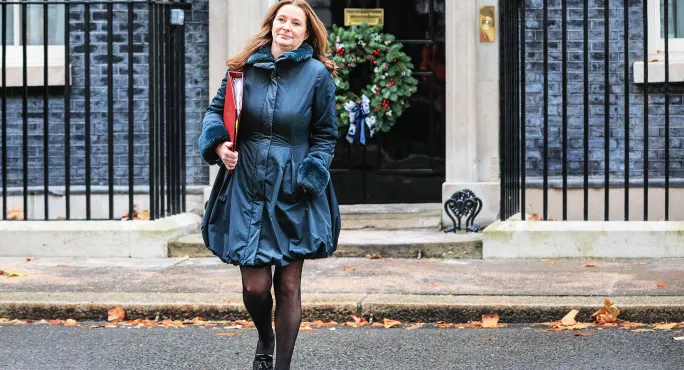Keegan urges ‘top earner’ teachers not to strike

The education secretary has said she “very much” hopes that teachers “don’t strike” next year, as the profession is “probably in the top 10 per cent of earners in some parts of the country”.
Speaking this morning on radio station LBC, Gillian Keegan added that the £2 billion of extra funding announced for schools by the chancellor in his Autumn Statement last month had gone a “long way to easing a lot of the pressures and a lot of the concerns that people had about redundancies” and other cuts.
Ms Keegan was speaking as a new report showed that workers in the education sector, including teachers, have experienced some of the lowest pay growth in the past 10 years, alongside those in the health, public administration and social care sectors.
- Jeremy Hunt: Schools to get extra £4.6 billion over two years, says chancellor
- Judicial review: School unions get green light to fight new strike law
- Teacher strikes: What can school leaders expect?
Teaching unions the NASUWT and the NEU, and school leaders’ union the NAHT, are balloting members on strike action over pay in England and Wales, while the Association of School and College Leaders held a consultative ballot on whether to launch a strike vote.
Results from the ballots are expected in January and if teachers vote to strike they will join paramedics, nurses and post and rail workers, as well as Border Force staff, who are walking out this month.
The threat of teacher strikes over pay
This morning Ms Keegan said her cousin had just started teaching and was on £28,000 a year.
“She is single and lives with her mum and dad but the reality is that she is in a good career. It’s probably within the top 10 per cent of earners in some parts of the country,” she said.
However, one teacher from Bromley, South London, replied: “The fact that teachers are one of the higher paid public servants in this country, as a low-wage economy, I think that is something more shameful than something to celebrate.
“I know how far my wages go each month. I know many people who have second and third jobs because they cannot make ends meet.
“If you live at home and you don’t have any outgoings or children, that money doesn’t have to go towards paying a mortgage. When you write down the numbers on a piece of paper they don’t add up.”
The teacher added she had voted to strike: “It’s a very difficult thing to do. You have chosen that job because you want to make a difference to people’s lives and the last thing you want to do is not turn up to work.”
Ms Keegan said today: “I hope teachers do not vote to strike but that is their right. What we are trying to do is make sure we do not bake in inflation.
“If we can stabilise the economy we will be seeing inflation coming down next year. It’s really serious because you cannot spend your way out of it; you will end up with spiralling inflation and if you spend extra money it will just be eaten up by rent and other things.”
When asked why teachers were leaving the profession, Ms Keegan said the “pandemic has had a massive impact on education”.
“They’re doing a lot to catch up. And it has, you know, it’s been a tough environment,” she added.
‘Lost pay growth’
Today’s Public First report claims to “shed new light on the lost decade” of pay growth for different workers.
It reveals that workers in the education sector, including teachers, saw some of the lowest pay growth in the past 10 years, at just 4.3 per cent.
Researchers analysed data gathered by the Economic and Social Research Council’s longitudinal Understanding Society survey, led by a team at the University of Essex, which tracks individuals and households over time to provide insight into the income progression (or regression) of different groups.
They also investigated trends by employment sector, analysing workers who were in the same sector in both 2010-11 and 2020-21.
The report says that “over this decade, the median public sector worker fared badly in terms of earnings, with education, health, public administration and social care languishing at the bottom...when it comes to pay growth”.
“With high inflation and further public sector wage restraint since 2020, it’s small wonder industrial unrest is ramping up,” it adds.
However, the report also says that among the cohort of workers who were not in the same employment sector in 2010-11 and 2020-21, “earnings had fallen over the decade after adjusting for inflation”.
But it says this could be due to “factors such as unemployment between these years leading individuals to change industry and start again at a similar or lower rung of the career ladder”.
Bridget Phillipson, Labour’s shadow education secretary, said Ms Keegan’s comments that teachers’ salaries are in the top 10 per cent of earners in some parts of the country were “staggeringly out-of-touch”.
Ms Phillipson added that a Labour government would “boost working conditions for our teaching workforce by recruiting 6,500 more teachers, paid for by ending tax breaks for private schools”.
You need a Tes subscription to read this article
Subscribe now to read this article and get other subscriber-only content:
- Unlimited access to all Tes magazine content
- Exclusive subscriber-only stories
- Award-winning email newsletters
Already a subscriber? Log in
You need a subscription to read this article
Subscribe now to read this article and get other subscriber-only content, including:
- Unlimited access to all Tes magazine content
- Exclusive subscriber-only stories
- Award-winning email newsletters
topics in this article



